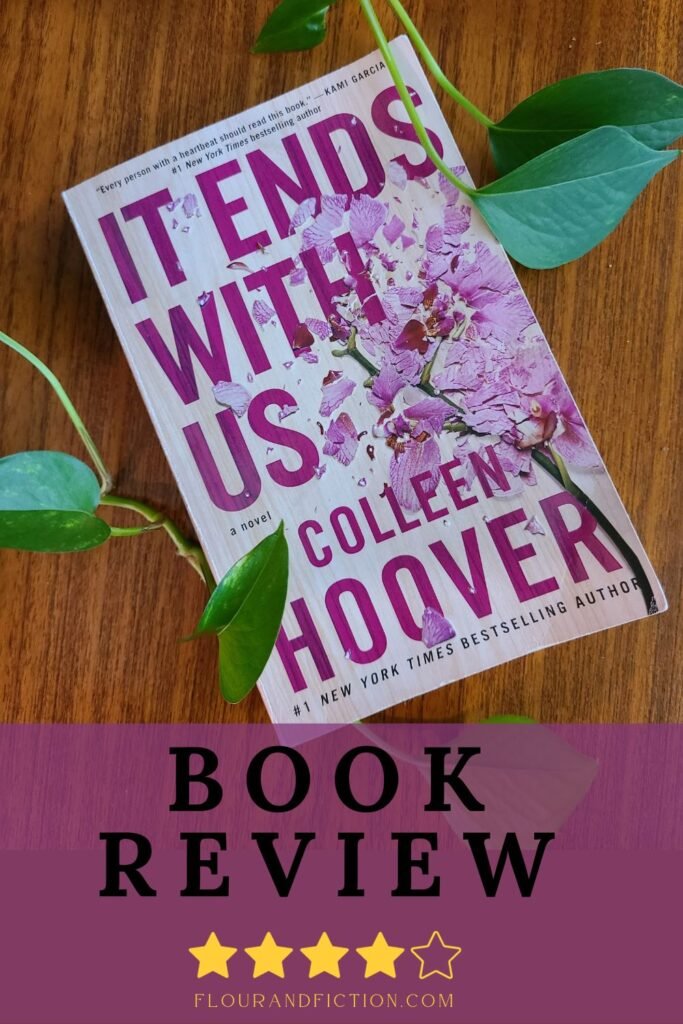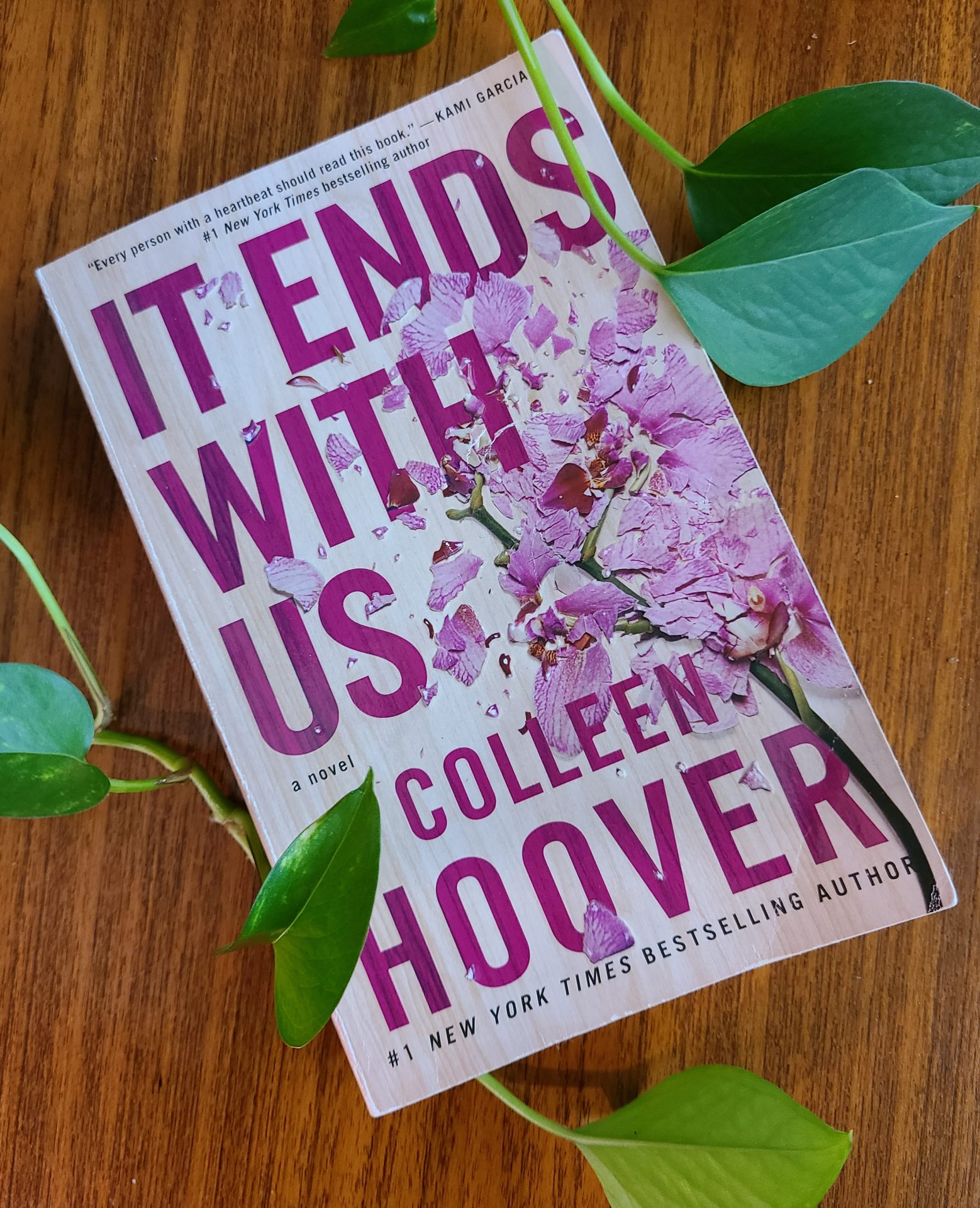My Rating for It Ends with Us

When a book is this intense by the time you read the dedication, you can just imagine was the rest of the book will be like.
For my father, who tried his very best not to be his worst.
-Colleen Hoover
And for my mother, who made sure we never saw him at his worst.
It Ends with Us by Colleen Hoover has been making its round on the book club circuit as well as booktok. This book was also a Goodreads Choice Award Winner for Best Romance (2016). It was recommended to me by a fellow bookclubber, so when I saw it at the free lending library in the hotel I stayed at on vacation, I immediately grabbed it.
I found it confusing that the first book in the series is called It Ends with Us and the second book is called It Starts with Us. If you’re going to begin reading this series, start with the pink book. If you’ve already read the sequel, read my Book Review of It Starts with Us.
Synopsis
Lily Bloom had a rough childhood growing up in small-town Maine, the daughter of the Mayor with a secret home life. Although she can’t always prevent the domestic violence her father unleashes on her mother, she takes solace in her garden and her only friend, Atlas Corrigan.
As an adult, Lily has come a long way, putting as much distance between her adult and childhood self as she can. She graduated from college, moved to Boston, and started her own business at the age of 23. Enter Ryle Kincaid, sexy neurosurgeon, and staunch anti-dater. When he uncharacteristically starts to fall for her, she wonders if her life might be too good to be true.
After her father’s death, The only remaining link to Lily’s past is her mom and her first true love – Atlas. When Atlas resurfaces after many years (glown-up by the way), Lily has to face her troubling past, leaving her questioning her present, and fearing for her future.
My Take on It Ends with Us
Spoiler Alert!!!
I gave this book 4 stars, which means it was reeeally good. I hesitate to say I “liked” it since the major theme of domestic violence is definitely not something I “like”. However, the author explains in the author’s note at the end of the book that this is semi-autobiographical (Don’t skip the author’s note!). Hoover acknowledges that this is not everyone’s story or experience with domestic violence but it is loosely based on her story. I appreciate how nuanced it was and I think that’s the best part of the book. None of Lily’s choices are simple or easy.
Hoover created a totally sexy and loveable character in Ryle, the neurosurgeon. (I couldn’t figure out whether his name was Ryle like Kyle or Ryle like Riley for the longest time…until baby Rylee was born!) She includes all your favorite tropes that make you swoon:
- he’s a neurosurgeon
- he’s rich
- he saves babies’ lives
- he looks great in scrubs
- he’s un-gettable until he magically falls in love with Lily (fast)
- he works enough that Lily has plenty of time to pursue her own endeavors
- his family is amazing and loving and adores Lily
That’s why it’s totally crushing when he turns out to be the “bad guy”. But it’s hard to even tell if he’s the bad guy because the first time he hurts Lily, it seems like an accident. You want to believe it’s an accident.
It’s brilliant the way the author makes you fall in love with Ryle, right along with Lily, and makes him so complex that you (and Lily) keep making excuses for him. I even reserved judgement on him until the 2nd time he hurt her, and later regretted giving him a second chance.
Did you Suspect Ryle?
I should have known. The foreshadowing in the first scene was strong, but I somehow overlooked it. The book opens with Lily sitting on the edge of a building, staring out silently at the night sky, mourning the loss of her father. (If not mourning, then at least processing the events of his funeral.) She’s unexpectedly joined by Ryle who also comes up to the roof to get away and process his own emotions. Thinking he’s alone, Ryle started to violently kick an innocent patio chair repeatedly, getting out his anger.
Lily isn’t terribly off-put by this in the moment (it sparks their meet-cute), and neither was I. I totally accepted it, did not notice the red flag, and proceeded to fall in love with the character anyway. What does that say about how we are socialized by gender? Lily even says:
To be honest, I’m a little envious. Here this guys is, taking his aggression out on patio furniture like a champ. He’s obviously had a shitty day, as have I, but whereas I keep my aggression pent up until it manifests in the form of passive-aggressiveness, this guy actually has an outlet.
-“It Ends with Us”, Colleen Hoover
To me, it says we are socialized to believe violence is an acceptable way for men to process emotions, but if a woman acted out similarly, it would be embarrassing – and overreaction. A man can act like that and still be loveable.
This is not just a romance novel. This book made me think a lot and even question my own judgement.
Critique for It Ends with Us
A few issues I had with the book:
1. Introducing Atlas and the Ellen Diaries
Though central to the plot, the way the Ellen Diaries were introduced seemed like a non-sequitur. Lily was just bored and started reading her old diaries? For something so central, the tie-in could have been better.
2. The Traditional Concept of Marriage
In Lily’s final journal entry to Ellen, she agonizes over one major reason for not wanting to leave Ryle – the canonical line from traditional Christian wedding vows: “for better or for worse”. Maybe this was a realistic hurdle for the character and her cultural background, I just wish in this day and age we could define new concepts of marriage that don’t justify staying with an abuser, and that this wouldn’t have been a problem for Lily.
3. Everything Changes for Ryle when he Holds his Baby
Of course they had a daughter. I knew it was going to be a daughter just so this teaching moment could occur. I’m glad that Lily got her moment in the end to make Ryle face his wrongdoing and theatrically divorce him. But why was he only convinced that Lily shouldn’t tolerate his abuse when asked what he would do if the same thing happened to his daughter? So disappointing. Why does it take holding a baby for him to empathize with his adult wife? Do better, Ryle.
Conclusion
I love a tieback to the title. At the end, Lily says “It ends with us”. The cycle of domestic violence ends with her and her daughter. She broke the cycle.
It Ends with Us gets 4 stars from me – it was a page turner for sure. I found the narrator’s voice to be very readable and relatable. I appreciate that this was a very nuanced story of love tainted with domestic violence. Lily’s thoughts are laid bare as she wrestles with wanting to forgive the man she loves when she knows she shouldn’t. She relates to her mom and realizes the folly of her victim-blaming. I like that the author makes this message clear when Lily questions why people on the outside tend to ask why the victim stayed rather than why the perpetrator was abusive.
Did I order the sequel immediately after finishing this book? Absolutely, I did.
Grab the sequel, then read my review of “It Starts with Us”.
Recommended Reading
If you liked this book, try:
- It Starts with Us by Colleen Hoover (#2 in this series)

- Gone Girl by Gillian Flynn

- The Perfect Marriage by Jeneva Rose




